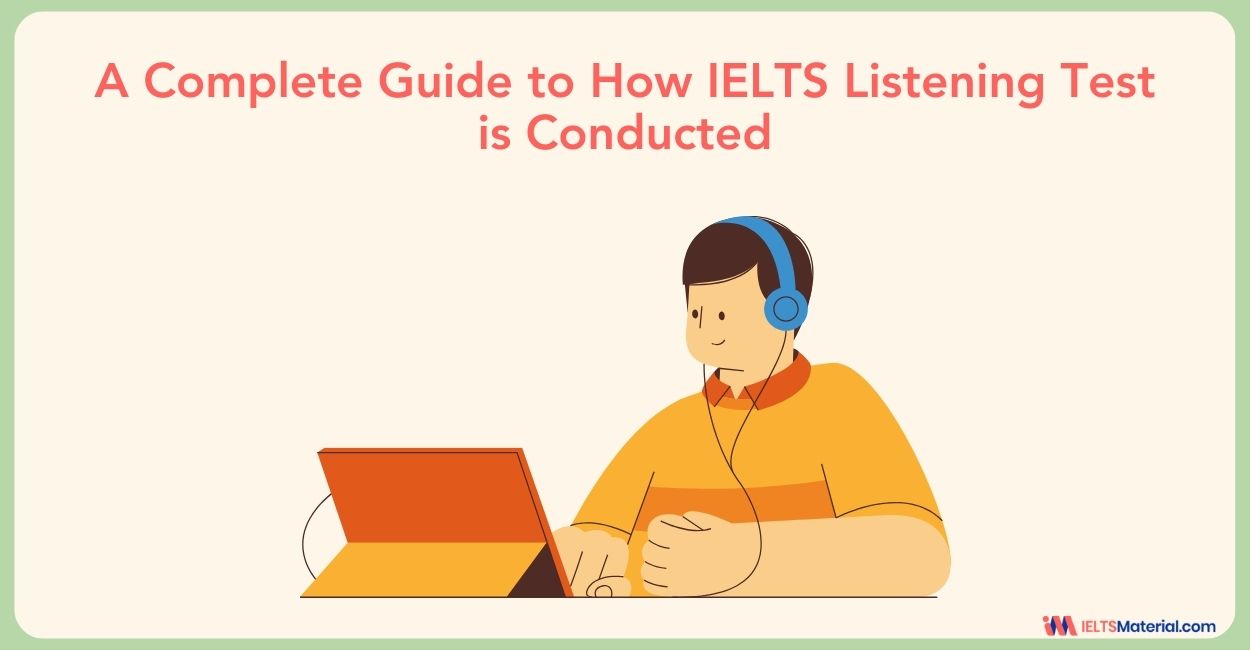IELTS Listening Section Exam Guide
Looking for an IELTS Listening Section exam guide? Discover its format, question types, sample answers, and top tips to excel in your IELTS Listening test!

Limited-Time Offer : Access a FREE 10-Day IELTS Study Plan!
The IELTS Listening test is one of the most crucial sections of the IELTS exam, designed to assess your ability to understand spoken English in a variety of contexts. It’s a 30-minute challenge that can significantly influence your overall IELTS Band Score. But don't worry! With the right strategies and preparation, you can conquer it with confidence.
This guide will walk you through everything you need to know about the IELTS Listening test: its format, question types, tips, and even examples to help you prepare effectively.
IELTS Listening Exam Format
The Listening Section lasts 30 minutes, with an additional 10 minutes for transferring answers. It has four sections featuring different audio recordings, each followed by corresponding questions.
Key Features:
- Audio Recordings: Conversations and monologues by native speakers.
- Question Types: Includes multiple-choice, matching, sentence completion, and more.
- Scoring: Each correct answer gives 1 mark, with a total of 40 marks.
- Answer Transfer: Write answers on a separate sheet after the recording ends.
IELTS Listening Section-Wise Breakdown
Each of the four sections in the IELTS Listening test serves a unique purpose:
- Section 1: A conversation between two people in a social context (e.g., booking a hotel).
- Section 2: A monologue on a general topic (e.g., a speech about city parks).
- Section 3: A conversation between up to four people in an academic setting (e.g., a group discussing a project).
- Section 4: A monologue on an academic subject (e.g., a lecture on history).
As the sections progress, the difficulty level increases, requiring you to stay focused throughout.
Access free practice materials for a better IELTS listening band score. Download now!
Section 1: General Conversation
Format:
- Type: Face-to-face or telephone conversation
- Topic: General interest, often related to everyday situations
- Length: 10 questions, usually with an example at the beginning
- Tasks: 1 or 2 tasks, with a pause between them
What It Tests:
- Specific Information: Understanding of details such as dates, names, addresses, and everyday objects.
- Spelling: All words must be spelled correctly (e.g., names of streets, people, companies).
- Numbers: You may need to write down years, phone numbers, or addresses.
- Example:
- £4.50 = "four pounds fifty" or "four fifty"
- $3135 = "thirty-one dollars and eighty-five cents" or "thirty-one eighty-five"
- 1985 = "nineteen eighty-five"
- 2015 = "twenty fifteen"
- 2000 = "two thousand", 2009 = "two thousand and nine"
- Example:
- Dates and Measurements:
- Dates can be written in different formats (e.g., "3rd March," "March 3rd," or "March 3").
- Measurements can be written as abbreviations (e.g., "25m" or "25 metres").
Section 2: Monologue / Announcement
Format:
- Type: Talk, speech, announcement, or recorded message by one speaker
- Topic: General interest
- Length: 10 questions, usually with two tasks (pause between tasks)
- Example: No example provided
What It Tests:
- Factual Information: Your ability to understand and select relevant information.
Boost your IELTS Listening skills with IELTS online Classes designed to boost your IELTS performance
Section 3: Discussion / Academic Life
Format:
- Type: Discussion between two to four speakers (e.g., a conversation between students and a lecturer)
- Topic: Aspects of academic life
- Length: 10 questions, usually with up to three tasks (pause between tasks)
- Example: No example provided
What It Tests:
- Key Facts and Ideas: Identifying key facts and how they relate to each other.
- Speakers’ Attitudes and Opinions: Recognizing opinions and attitudes in a conversation.
Section 4: Academic Lecture
Format:
- Type: Lecture, talk, or presentation on an academic topic (e.g., scientific or educational)
- Topic: Academic interest
- Length: 10 questions, up to three tasks (no pause between tasks)
- Example: No example provided
What It Tests:
- Understanding of Opinion: Following the speaker’s opinion and viewpoints.
- Spelling: Accuracy in spelling.
- Understanding Ideas: Recognizing different ideas, such as causes, effects, and consequences.
- Organization of Ideas: Following how ideas are organized, identifying main points, specific information, and attitudes.
Be a part of IELTS webinars and learn how to use the IELTS preparation material given below efficiently
IELTS Listening Question Types
During the IELTS Listening Exam, You’ll encounter a variety of question types. Each question type tests your listening skills differently, so practicing all formats is key. Here’s an overview of question types with their tips.
1. Note Completion
Note Completion in IELTS Listening involves filling in missing information in notes based on the recording.
Tips to ace:
- Always check the word limit in the instructions.
- Predict the type of word (e.g., noun, verb, number) that fits each gap.
- Focus on the context and avoid dwelling on missed answers.
2. Multiple Choice Questions
Multiple Choice questions in IELTS Listening require selecting one or more correct options based on the recording.
Tips to ace:
- Read the questions beforehand to understand what to listen for.
- Move on quickly if unsure to avoid missing the next answer.
- Pay attention to the introduction for useful context.
3. Form Completion
Form Completion in IELTS Listening involves filling in details like names, numbers, or addresses.
Tips to ace:
- Focus on specific details that fit into the form.
- Write answers directly to avoid confusion later.
- Check spelling carefully to avoid losing marks.
4. Table Completion
Table Completion requires completing a table with information from the recording.
Tips to ace:
- Follow the order of information in the table and recording.
- Use the table headings to guide what to listen for.
- Listen for keywords that match the table’s context.
5. Flow-chart Completion
Flow-chart Completion in IELTS Listening requires filling in the steps of a process.
Tips to ace:
- Understand the sequence of the flowchart before listening.
- Focus on transitions to identify each step or stage.
- Write exactly what you hear for accuracy.
6. Diagram Labelling
Diagram Labelling involves labeling parts of a diagram or plan using the recording’s details.
Tips to ace:
- Study the diagram and its layout before the recording starts.
- Listen for location-specific language like "next to" or "in front of."
- Stay focused on the details as the recording plays.
7. Map Labelling
Map Labelling requires identifying locations on a map using directions or descriptions in the recording.
Tips to ace:
- Familiarize yourself with the map and its layout beforehand.
- Use existing markers to follow along easily.
- Listen carefully to directions and descriptions in order.
8. Matching Questions
Matching Question tasks require connecting details from the recording to options provided.
Tips to ace:
- Listen closely for specific details related to the task.
- Match one piece of information to each option carefully.
- Stay focused on the relevant part of the recording.
9. Sentence Completion
Sentence Completion in IELTS Listening involves filling gaps in sentences with words from the recording.
Tips to ace:
- Listen for keywords to identify what fits the gap.
- Ensure your answers are grammatically correct.
- Write concise and accurate responses based on what you hear.
Enhance your IELTS Listening skills by practicing with free online IELTS Listening tests from the British Council
Mastering the IELTS Listening Section is essential for achieving a high overall band score. By understanding the exam format, familiarizing yourself with various question types, and applying effective strategies, you can enhance your listening skills and boost your confidence. Consistent practice, active listening, and attention to detail are key components of success. Approach your preparation with dedication, and you'll be well-equipped to excel in the IELTS Listening test.
Also Check:

Start Preparing for IELTS: Get Your 10-Day Study Plan Today!
Explore other Listening Articles

Kasturika Samanta

Kasturika Samanta

Kasturika Samanta
Recent Articles

Kasturika Samanta

Prity Mallick

Haniya Yashfeen

Kasturika Samanta





Post your Comments